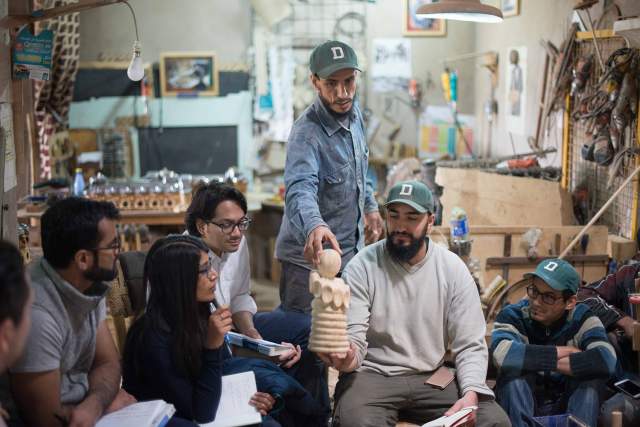Tuck Social Venture Fund Makes Second Investment
The fund is taking a $25,000 equity stake in solar company Brightfield Transportation Solutions.

Brightfield Transportation has deployed over $2 million in charging infrastructure on public and private property in N. Carolina
The Tuck Social Venture Fund (TSVF), a student-led impact investing fund, is advancing the field of sustainable energy by taking a $25,000 equity stake in Brightfield Transportation Solutions, which makes solar-integrated charging stations for electric cars. The investment is the fund’s second since launching in 2015, when it was seeded with $100,000 in dedicated alumni contributions.
The fund is comprised of managing directors Jodine Gordon T’18, and Muyambi Muyambi T’18, and directors Benjamin Hartwell T’18, Meghan Lynch T’18, Ana Belen Manon Suarez T’18, and David Whitehead T’18. The team’s experience spans numerous industries—medicine, education, and technology—and creates a balance that’s helpful when evaluating opportunities. Using an all-hands-on-deck approach, everyone has a role in sourcing deals, devising investment strategies, and immersing themselves in due diligence. The team examined more than 100 startups across industries such as health care, agriculture, and financial services before choosing Brightfield.
“There are around two million electric vehicles on the road globally, and we think that’s going to grow,” Muyambi says, pointing simultaneously to a scarcity of vehicle charging stations. “We think Brightfield is part of the solution.” Brightfield’s seasoned management team, strong market demand for electric vehicles, and the company’s expansion plans presented a compelling investment opportunity for the fund.
The team collaborated with April Salas, executive director of the Revers Center for Energy, to understand the larger dynamics of the energy market and gain a sense of what a sustainable and compelling business model in the energy market would look like. They also worked with the fund’s advisors, Curt Welling D’71, T’77, a senior fellow with the Center for Business, Government & Society, and Daniella Reichstetter T’07, executive director of Entrepreneurship at the Center for Private Equity and Entrepreneurship. The team finds learning from their first-hand experiences in deal-making and entrepreneurship to be “incredibly valuable.”
As an experiential learning opportunity, the fund is unique in the way that it mimics the real world. Students are able to leverage knowledge from the classroom and use it while putting real money to work.
It’s easy to go into class and talk about strategy, marketing, and valuation, but the Tuck Social Venture Fund helps you put it into practice.
There isn’t much consensus in the industry on how to measure social or environmental impact. However, the experience of running the fund has even helped the team members craft their own definition and framework for what qualifies an investment as impactful.
“The way we think about impact is that the social or environmental impact must scale as the business scales,” Gordon says. This is why Brightfield fits the bill. “As they sell more solar rechargeable stations, they decrease reliance on fossil fuels and increase access to electric vehicles.”
The fund’s first investment in 2017 was a $25,000 convertible note in Education Modified, a Boston-based education technology startup. As the Tuck Social Venture Fund continues to refine their strategy, they have begun to collaborate with other business schools with the hope of pooling resources and investment capital in the future to collectively broaden their reach and impact.

